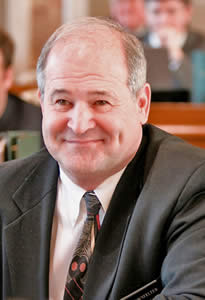
Modeled on best practices adopted in other states, Homes Within Reach is being launched across Kansas to help social service agencies and community groups use housing as a primary intervention for persons with mental illness or related disabilities.
Leading partners in this consulting and contracting initiative include Kim Wilson Housing, Kansas City, Kan.; Mental Health Association of South Central Kansas, Wichita, Kan.; and Prairie View, Inc., Newton, Kan.
“There is mounting evidence that addressing a person’s most basic needs, such as housing, before providing mental health or substance abuse interventions is a critical and resource-saving first step,” said James Glenn, executive director, Kim Wilson Housing . “HWR’s mission is to help social service agencies better steward limited resources by making safe, desirable and affordable permanent housing a first step in the recovery process and not a reward to be collected upon psychiatric stabilization or sobriety.”
HWR has three goals in support of its mission:
• To increase the number of housing options statewide specifically for persons with mental illness or substance use disorders.
• To leverage resources and share collective expertise.
• To document successes by collecting accurate qualitative and quantitative data.
Housing affordability gap
Of the 45,500 Kansans with disabilities receiving Supplemental Security Income in 2012, between 64 to 78 percent of their monthly SSI income of $698, on average, was spent on rent.
“This is far beyond the 30 percent of income affordability rate projected by HUD for rent and utilities,” said Christy McMurphy, KWH director of housing strategies, eastern and central Kansas, who is providing staff support to the new HWR initiative. “This housing affordability gap leaves many people at risk of becoming homeless or without sufficient income for basic necessities like food, transportation or medication,” McMurphy added.
“Having a place to call ‘home’ begins the process of healing and is the cornerstone of recovery,” said Michael Kress, senior director of housing and facilities, Mental Health Association of South Central Kansas. “Homes Within Reach will facilitate our ability to serve as a resource to help other mental health and substance use disorder agencies develop housing strategies based on a unified vision and action plan to advance quality affordable housing.”
Streamlining access to housing
HWR services include:
• Development of housing strategies and plans for individual or collaborating agencies or a community.
• Pre-development and development of housing opportunities.
• Financial tracking, reporting and ensuring compliance with federal regulations.
• Stakeholder outreach-connection and relationship maintenance.
• Mediation to prevent evictions.
• Collective data-outcome tracking and reporting.
“HWR will focus on identifying special housing needs among persons with behavioral health problems and related disabilities throughout Kansas, and then work to streamline their access to existing permanent supportive housing in their communities,” said Brad Schmidt, director of housing, Prairie View Inc.
McMurphy explained that this statewide initiative is a compilation of successful and time-tested campaigns and initiatives across the country.
HWR incorporates “lessons learned” from the following:
• Tennessee’s Creating Homes Initiative
• Stand Up to Cancer (shared expertise and business model)
• Building Tulsa, Building Lives Campaign
• Corporation for Supportive Housing’s Consulting Network
• 100,000 Homes Campaign
“These models have demonstrated dramatic, continued success even during the recession,” McMurphy said. “With the exception of Stand Up to Cancer, these initiatives have led to a significant reduction of homelessness, unnecessary hospitalizations, criminal behaviors and interactions with law enforcement. Stand Up to Cancer’s mission is to unite in one unstoppable movement to end all kinds of cancer, and this business structure is what we want to adapt to end homelessness. We believe our collective efforts through Homes Within Reach can achieve this objective.”
For more information about HWR, contact McMurphy at 913-233-3356 or mcmurphy_c@wmhci.org.
– Story from Kim Wilson Housing and Wyandot Inc.


